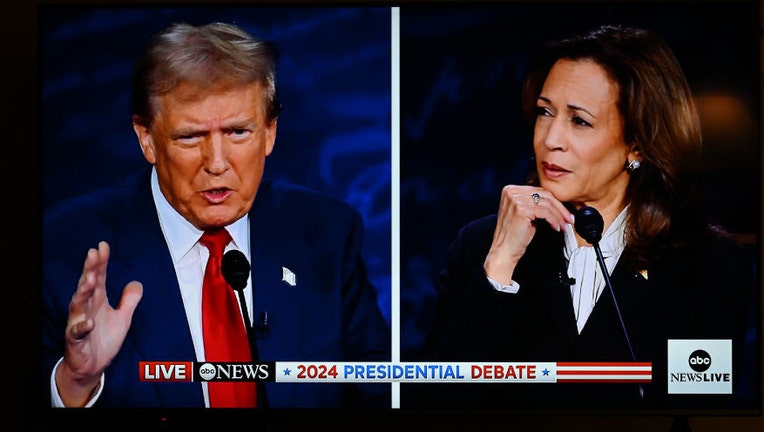Where Trump, Harris stand on organized labor

FILE-Former President of the United States Donald J. Trump and Vice President Harris's first Presidential Debate is displayed on a TV screen in Foster City, California, United States on September 10, 2024. (Photo by Tayfun Coskun/Anadolu via Getty Im
Vice President Kamala Harris and Donald Trump have shared their platforms on key issues pertinent to voters for the upcoming election, including workers' rights.
While Harris and Trump have addressed a plan to support workers nationwide, the Teamsters union declined to endorse either presidential candidate, with the organization saying neither one had the support of the 1.3 million-member union.
Issue: Unions and organized labor
What Trump has said
Donald Trump stirred controversy after he and Tesla CEO Elon Musk discussed on social media Musk allegedly firing striking workers. The United Auto Workers union filed unfair labor practice charges against Trump and Musk earlier this month.
In documents filed on Sept. 13 with the National Labor Relations Board, the union alleges that both men interfered with workers who may want to exercise their right to join a union, the Associated Press noted.
RELATED: Where Trump, Harris stand on the economy, wages, and taxes
Trump and his campaign have promised "America First" for workers without giving specifics. Trump has discussed eliminating taxes on workers’ tips but has not specified whether he wants to exempt tips from just income taxes or from the payroll tax as well. The payroll tax funds Medicare and Social Security.
For workers, a blanket exemption would mean more take-home pay. And for the federal government, it could mean larger budget deficits, the Associated Press noted.
During his presidency, Trump signed three executive orders in 2018 that restricted the labor rights of approximately 950,000 federal government employees who belong to unions. In 2020, he signed another measure, known as Schedule F, which the Washington Post reported was created to dismantle civil service job protections for workers across the government. It would have paved the way for the workers to be replaced with others, including political partisans, subject to termination at will — a move Trump reportedly supported because he felt nonpartisan bureaucrats were hindering his policies.
Although it is not part of Trump's official agenda, Project 2025, the 900-page plan pulled together by the conservative Heritage Foundation, details how a Republican administration would expand the power of the president and gut the federal workforce. Trump has claimed to know nothing about Project 2025, despite several of his former staff members being involved in the creation of the document.
What Harris has said
Kamala Harris has pledged to sign the Protecting the Right to Organize Act (PRO Act) which would give workers more power to organize. The Teamsters support the bill and it has passed the House multiple times but has not been signed into law.
Among the bill's provisions is one to upend so-called "right-to-work" laws, which make it harder to fund unions by not requiring members to pay dues. According to the National Conference of State Legislatures, currently 26 states have "right to work" laws. The bill also would have expanded who could join unions and prohibit some anti-union tactics by employers.
RELATED: Where Trump, Harris stand on abortion rights
If elected president, Harris says she plans to sign the Public Service Freedom to Negotiate Act, which would make the freedom for public service workers to form unions the law of the land, according to Harris’ campaign website.
To support workers and boost the nation’s middle class, Harris shared a proposal to eliminate taxes on tips paid to restaurant and other service industry employees, a policy similar to Trump’s plan.
The Harris campaign told the Associated Press in August that as president she would work with Congress to draft a proposal that includes an income limit and other provisions to keep hedge fund managers and lawyers from structuring their compensation to try to take advantage of the policy. Harris also would push for the proposal alongside one to increase the federal minimum wage.
Harris also chaired the White House Task Force on Worker Organizing and Empowerment aimed at limiting barriers to unionization, USA Today noted. The task force ordered federal agencies to give their unions a bigger seat at the table and to ensure that new and existing employees were aware of their right to join a union.
As California’s attorney general, Harris signed an order in 2015 to crack down on employer wage theft and other illegal labor practices. Harris has also pushed for the Domestic Workers Bill of Rights Act to provide domestic workers federal labor law protections for the first time and guarantee a minimum wage, overtime pay, meal breaks, and protections against harassment and discrimination.
A campaign memo noted that as vice president, Harris cast the deciding vote to pass the Butch Lewis Act, after backing the bill while senator, ensuring millions of retired union workers would still receive their pensions.

